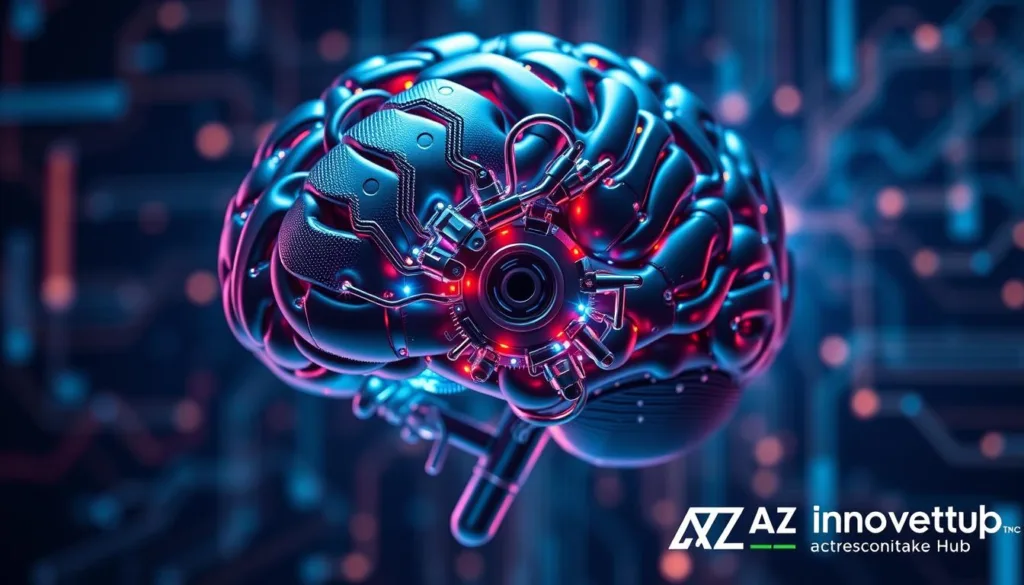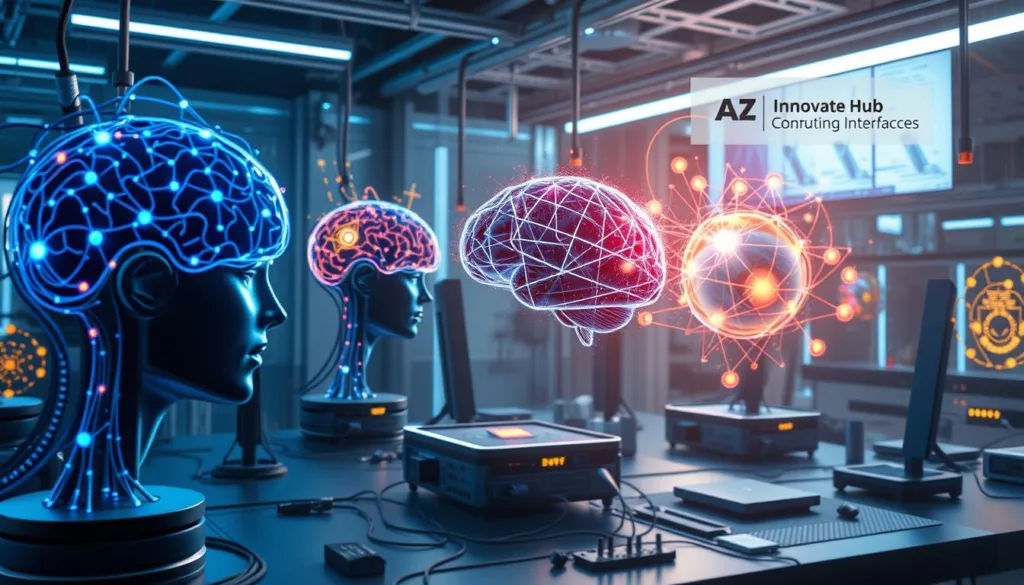This is the fourth article in our series on Neuralink, where we address the ethical considerations surrounding brain-computer interfaces. Be sure to read Part 1, 2 and 3 for a complete understanding.
Part 1: Neuralink Introduction,
Elon Musk’s Neuralink is on the cusp of revolutionizing human-technology interactions with its innovative brain implant. The upcoming ‘Telepathy’ product promises unprecedented cognitive enhancement, enabling users to control devices with their minds. This breakthrough will particularly benefit individuals with mobility impairments.
Neuralink’s long-term vision is ambitious: upgrading human brain capacity for enhanced memory, focus, and intelligence. By seamlessly integrating technology into our minds, Musk’s neurotech company aims to redefine the future of human cognition.
Key Takeaways
- Neuralink’s “Telepathy” product aims to allow users to control devices with the power of thought alone.
- Initial human trials of Neuralink’s brain implants have shown promising results, with the first recipient recovering well.
- The ethical implications of cognitive enhancement, including access and social divides, must be carefully considered.
Introducing Neuralink's Groundbreaking Technology
Neuralink is leading a revolution in brain-to-internet connection. They’ve created a wireless brain-computer interface with ultra-fine threads. These threads are stitched into the brain by a special robot. This tech aims to link our minds with digital devices, opening new ways for us to interact with computer.
Brain Implant: A Revolutionary Step towards Enhancing Human Capabilities
Musk wants this tech to do more than just restore lost functions. He hopes it will also boost our brain power and even merge our minds with AI. Neuralink has already put a computer chip in a human brain, with a 100% success rate. The chip, called ‘Link’, is as small as five stacked coins and has been approved for human trials by the U.S. FDA.
Key Features of Neuralink's Brain-Computer Interface
Neuralink’s ‘Telepathy’ uses “ultra-fine’ threads for sending brain signals. Despite safety concerns and fines for violating rules, Neuralink is pushing forward. Another company, Synchron from Australia, uses a less invasive method for their brain-machine interface.
The implant aims to read neuron spikes for translating thoughts into actions. Must has shared early positive results, showing the chip works with the human brain. The main goal is to let people with paralysis or movement disorders control devices with their thoughts.
“Neuralink promises a future where human intelligence can be significantly enhanced. This includes boosting memory, improving focus, and providing real-time cognitive assistance. The brain-to-internet connection could revolutionize problem-solving and decision-making.
Neuralink’s tech was shown by a 29-year-old paralyzed man, Noland Arbaugh, in a big step forward for BCIs. Neuralink’s idea of “cognitive compartmentalization” is a new way to handle many thoughts or tasks at one, thanks to advanced implants. This idea challenges our current mind limits and opens new areas in exploring consciousness, multitasking, and AI integration.
Neuralink’s tech is set to change what we can do, making cognitive boosts and brain-to-internet links a reality in the future.
The Promise of Cognitive Enhancement
Boosting Memory and Focus: Unlocking the brain's Full Potentia
Neuralink’s technology is changing how we think. It aims to make our brains work better by directly connecting with them. This could make us smarter and solve problems faster.
The chip has 1,024 electrodes to read brain signals. Neuralink’s robot can put it in your brain more accurately than a human. The five-year trial will test how well it works.
But there are big worries about privacy and how it could change society. Tests on animals showed good results but also risks like paralysis. Experts say we need to be careful and open about these risks.
“Neuralink’s technology could impact healthcare by making treatments better. It could also make us smarter and help us talk to each other’s brains.”
Neuralink’s tech is both thrilling and complex. It could make us smarter and solve problems better. But, we must carefully think about the ethics and long-term effects.
Neuralink's Initial Applicaitons: Restoring Lost Functions
Neuralink, is changing lives for people with disabilities or paralysis. Their “Telepathy” product lets users control computers and devices with their minds. This is a big change in how we interact with technology.
Neuralink’s tech aims to bring back lost functions and give people more independence. The Neuralink chip, placed in the brain, has thousands of tiny electrodes. These electrodes record and stimulate brain acitvity.
This technology is very promising for those who can’t use their limbs. It can turn brain signals into wireless control of devices.
Neuralink’s early tests have shown great results. People can control computer cursors with their minds in under five minutes. This beats all previous records for brain-computer interface (BCI) performance.
The company is also working on more complex tasks. They aim to make users able to write with robotic arms or control wheelchairs.

Neuralink is exploring new frontiers but faces important safety and ethics questions. They must address brain surgery risks, long-term safety, and data privacy.
Despite these challenges, Neuralink’s technology has huge promise. It could help people regain control over their lives and surroundings. This could change the lives of many who struggle with mobility and independence.
Ethical Considerations and Societal Implications
Neuralink’s technology aims to boosts human intelligence but raises big ethical questions. Ethical AI and neurorights are key as Neuralink plans to make brain implants for human enhancement.
Addressing Concerns of Access and Possible Societal Divides
One big worry is that only the rich might get to use this tech. Neuralink’s implants could make people with them seem smarter and more focused. This could make our society even more divided.
Also, we need to think about how this tech might change us over time. As it gets better, we must figure out how to use it right. We need to make sure everyone has a chance to use it.
Neuralink’s tech is very promising, but we must think deeply about its ethics. We need to make sure it helps everyone, not just a few.
“The issue of justice is raised to the possible exacerbation of social inequalities if only wealthy individuals have access to brain-computer enhancements.”

Neuralink Cognitive Enhancement: A Game-Changer in Problem-Solving and Decision-Making
Neuralink’s technology is changing how we solve problems and make decisions. It connects our brains with digital systems. This could make us smarter and more creative in tackling tough challenges.
User like Noland Arbaugh have already seen amazing results. He played chess with his mind after being paralyzed for eight years. Neuralink’s goal is to make these brain implants common, helping everyone think better.
This technology also raises big questions. It’s like what philosophers David Chalmers and Andy Clarke talked about in 1998. They said our minds could work with outside tools, just like Neuralink is doing.
There are also big debates about what it means to be human. Neuralink’s tech makes us think about our identity and what it means to be alive.
Neuralink is changing how we work with AI. This could be huge for solving problems and making decisions. But we need to think carefully about the ethics and how it will affect society. The possibilities are exciting, though.
“Elon Musk’s longer-term goal for Neuralink is ‘human/AI symbiosis’, which he describes as ‘species-level important.'”
Transparency and Accountability in Neurotech Research
Neuralink is exploring new frontiers in neurotechnology but concerns about transparency and ethics have been raised. Experts stress the need for strict reporting standards and working with regulatory bodies. This ensures the field stays ethical and responsible.
Ensuring Scientific Integrity and Ethical Standards
The UN warns that brain implants and scans could let AI read and change our thoughts. Hannah Galvin, for example, has had up to 100 seizures a day from a neurotech device. UNESCO has called for a global ethical framework for neurotechnology to protect privacy and consent.
There’s growing need for government oversight of AI, including neurotechnology. Researchers and developers must work with policymakers and the public to build trust. This is key to advancing Neuralink’s technology responsibly and ethically.
As neurotechnology advances, it’s vital for neuralink and others to follow strict ethical and scientific standards. This means transparent clinical trial reports, working with regulators, and engaging with the public. Only through this commitment can we ensure cognitive enhancement is achieved responsibly and fairly.
“The growing recognition of the need for stronger government regulations to oversee AI technologies, particularly in sensitive areas like neurotechnology, further highlights the importance of transparency and accountability in this field.”
Competitive Landscape: Other Players in the Brain-Computer Interface Field
Neuralink is a big name in BCIs, but it’s not alone. Companies like Blackrock Neurotech, Synchron, and Paradromics are also making big moves. They’re all working on new BCIs devices.
These companies use different methods, from deep implants to stent-based devices. Each method has its own benefits and challenges. The BCI market is growing fast, expected to hit USD 5.31 billion by 2031.
The non-invasive tech is leading the market, making up 60.2% in 2024. This is thanks to better technology that’s easier to use. Countries like India and China are investing more in healthcare, which is good for BCIs.
Blackrock Neurotech is working on various BCI solutions. Synchron is using a stent-based implant to treat neurological issues. These innovations could change how we interact with the world.
Paradromics is creating high-bandwidth brain-computer interface device. These devices could help restore and enhance neural functions. With Neuralink and others, we’re moving towards a future where brain-computer interface tech will change everything.

Regulatory Challenges and Clinical Trials
Neuralink is working to bring a new brain chip to the market. But they face many regulatory hurdles. They’ve got FDA approval for a study on patients with quadriplegia. They need to prove their technology is safe and works well.
Navigating the Approval Process for Human Implantation
The FDA has strict rules for new medical devices. Neuralink’s brain chip is no different. The FDA has approved devices for conditions like Parkinson’s and dystonia.
Recently, a big study showed a BCI is safe for quadriparesis patients. Neuralink is starting a trial for people with paralysis.
Neuralink’s tech is a big step forward, but it’s also a bid challenge. They’ve successfully implanted a chip in a quadriplegic man, Noland Arbaugh. But about 85% of the device’s threads fell out of Arbaugh’s brain.
Arbaugh could only control the cursor when 15% of the threads were left. The chip is small, with electrodes as thin as their. Overcoming these issues is key to getting approval.
The OECD has created guidelines for neurotech regulation. This will help Neuralink and others ensure their tech is used responsibly and ethically.
The Future of Neuralink: Enhancing Human Capabilities beyond Imagination
Neuralink wants to do more than just fix what’s broken. They aim to make humans better in ways we can’t even imagine. They’re working on improving memory, focus, and even connecting our minds with machines. But, these big steps forward also bring up big questions about right and wrong.
The Blindsight is a big step for neuralink. It’s designed to give sight back to those who’ve lost it, even if their optic nerves don’t work. The FDA has given it a thumbs up, which means it’s moving fast towards becoming a reality. Elon musk hopes it will let people born blind see for the first time, if their brains are ready.
The Blindsight device works in a new way. It uses the brain’s ability to change and adapt to new sights. It’s not just about seeing again. It’s about seeing in new ways, like infrared or ultraviolet.
Blindsight uses the brain’s flexibility to learn new senses. This means people can see in ways we can’t even imagine. It’s a big leap in how we see the world.
Neuralink’s work is part of a bigger trend. It’s about mixing technology with our bodies to enhance or replace our senses. This new way of seeing is just the start of what’s possible with BCIs.
But Neuralink’s goals go beyond just sight. They want to make our brains better in many ways. They’ve just got FDA approval for a study that could change how we think and feel. Founded by Elon Musk in 2016, Neuralink is leading the way in brain tech. But there are big questions about ethics in Neuralink’s work. They’re working closely with the FDA to make sure everything is safe and right. It’s a tough road, but they’re committed to making it work.
As Neuralink’s tech gets better, we’re looking at a future where our brains can do more than ever before. They want to make us better at solving problems and seeing the world in new ways. It’s a future that’s both exciting and a little scary.
Conclusion
Neuralink’s technology is a big step forward in neurotechnology. It could greatly improve human intelligence and abilities. This BCI could help us regain lost functions and boost memory, focus, and problem-solving skills.
But we must think carefully about the ethics and how society will be affected. Many in the U.S. worry that brain chips could harm society. There’s a big gap in how people see these advancements. As Neuralink moves forward with trials and regulations, we face exciting and complex questions. These questions make us think deeply about how this technology could change us.
The success of Neuralink’s tech depends on balancing its benefits with ethical and societal worries. We must make sure this innovation is used in a way that helps and uplifts all of humanity.
FAQ
Sources:
- Elon Musk Teases First Neuralink Products After Company Implants First Brain Chip In Human
- Neuralink’s Groundbreaking Achievement: First Human Brain Chip Implant
- A New Cognitive Compartmentalization with Neural Implants
- Neuralink’s Brain Chip: How It Works and What It Means | Capitol Technology University
